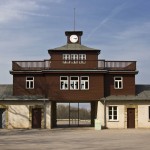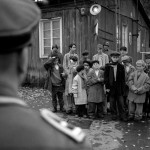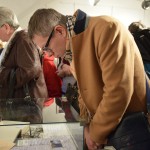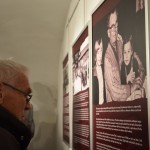The long-ignored noble gesture of Antonín Kalina, a Czechoslovak communist who was interned at Buchenwald. But the hundreds of Jewish children he saved have never forgotten
Antonín Kalina’s noble-achievement is the story of an ordinary hero, a Czechoslovak communist named Righteous among the nations in the state of Israel. His is the life of a great man of the twentieth century, who is still not so well known, and a man of courage and altruism, who defended the weak during Europe’s darkest: the Nazi genocide. The son of a shoemaker from the town of Třebíč, Vysočina, where he was born in 1902, Kalina grew up in a poor family: eleven children among brothers and sisters. His father taught him the trade, but Antonín decided to follow another path: he joined the communist Party and became a public official. It was, in fact, the Party membership that cost him his deportation as a political prisoner in 1939, following the Nazi occupation of Czechoslovakia.
Kalina was first sent to Dachau and later to the Buchenwald concentration camp. If before and after the war, this communist official had lived a simple and retired life – there are very few traces left – it was during the conflict that Kalina earned the title of Righteous. Just as Oskar Schindler, Giorgio Perlasca or Nicholas Winton, even Kalina, although differently, was able to save many lives that were destined to be exterminated during that horrible period of history. He did it for “his boys”, the young Jewish prisoners in Block 66 of the Buchenwald camp.
 But first things first. During his presence at Buchenwald, Kalina joined the underground resistance that operated on the ground and that was made up of communists, but not only. The men tried, as much as they could, to hinder the ruthless workings of the Nazi death machine. The SS often instructed prisoners to conduct certain daily operations in the camp. Between 1944 and 1945, Buchenwald had become extremely overcrowded, if we can allow for such word, and became even more inhumane compared to the previous years. The prisoners in the camp exceeded 100 thousand and the number of boys arriving at the camp were so numerous that the commanders decided to form a new block for them: Block 66. This detached area, made up of young boys, was so devastated and infested with diseases that the SS guards very rarely inspected it. The block was run by Kalina and his assistant Gustav Schiller, a Polish Jew.
But first things first. During his presence at Buchenwald, Kalina joined the underground resistance that operated on the ground and that was made up of communists, but not only. The men tried, as much as they could, to hinder the ruthless workings of the Nazi death machine. The SS often instructed prisoners to conduct certain daily operations in the camp. Between 1944 and 1945, Buchenwald had become extremely overcrowded, if we can allow for such word, and became even more inhumane compared to the previous years. The prisoners in the camp exceeded 100 thousand and the number of boys arriving at the camp were so numerous that the commanders decided to form a new block for them: Block 66. This detached area, made up of young boys, was so devastated and infested with diseases that the SS guards very rarely inspected it. The block was run by Kalina and his assistant Gustav Schiller, a Polish Jew.
The two of them went through great lengths to protect the boys, who were between the age of 12 and 16. These young men arrived from all over Europe and had already been subject to unimaginable traumas: ghettoization, brutality, deprivation, hunger, and often, the loss of their families. When they got to Buchenwald they were somewhat already “accustomed” to living in extreme conditions. Kalina did his best to make sure their conditions were improved significantly compared to what they had experienced previously. The Czechoslovak communist official was able to organize some lessons for them: mathematics, history, Yiddish. Kalina also tried tobring other boys to “his” block 66 and often tried to reunite brothers, or simply to alleviate their suffering. Some of them were Czech, and with them he was able to establish a special relationship. As the war was coming to an end and the camp situation getting even more serious – the Nazis trying to put into effect their final project of death – Kalina’s efforts to protect the kids in the block became riskier, but necessary.
As the Second World War was coming to an end and the Soviet forces were approaching the concentration camps – in today’s Poland – the Nazis decided that it was time to eliminate all the Buchenwald Jews. The camp commanders gave orders to line them up and take them to the so-called death-marches, by transferring the prisoners to other camps, which was a real death sentence for most these young men, who were already exhausted and weakened by years of captivity. However, by putting his life at risk, Antonín Kalina decided not to follow these orders. He decided not to send these young prisoners from Block 66 to the imposed meeting point and changed the religious affiliation on their identification cards: all the Jewish boys were now registered as Christians.
When the SS finally arrived, looking for the Jews from Block 66, Kalina was able to convince them that there were no more of them in the camp. It is, thus, thanks to his courage during this decisive and dramatic moment that, when Buchenwald became liberated on April 11, 1945, more than 900 Jewish children had been saved. It is reported that when they were liberated, all the Kalina’s boys received him in triumph.
At the end of the war, this public official, who had by now become a great hero, disappeared behind the Iron Curtain, and was never truly remembered for his gesture. Today, his body lies in the cemetery of Olšany in Prague, in a simple grave, just as his life, beside his wife and daughter. After all, if it had not been for the commitment of a group of survivors and scholars, the memory of Kalina’s noble gesture at Buchenwald would have been lost forever. He never wanted to recount his story. He never did anything to be remembered. But today, around the world, there are hundreds, or thousands of people who owe their existence to the outstanding effort of this great man. In the Jewish quarter of the city of Třebíč, a commemorative plaque is affixed to the old school in Leopold Pokorný street, to pay homage to his name.
This part of town is full of history and memories, even if it is now uninhabited after the deportation of its inhabitants during the Second World War. However, there are more than a hundred well-preserved buildings still standing there: two synagogues, the rabbi’s house, a hospital, a school as well as several broken-down houses around the narrow alleys. There is also one of the largest Jewish cemeteries in Europe, with over three thousand tombstones. It is in one of these buildings in the Ladislav Novák gallery, that on February 17, 2017, a hall was inaugurated to the memory of Antonín Kalina. The date is not casual, because it will be the 115th anniversary of his birth. His city, after decades of oblivion, wants to remember and make its hero known to the public: an installation is to be set up in the hall to recount the story of Kalina to the public.
He departed this life in 1990, with no medals, or heirs and the awards arrived posthumously. First with the 2012 Righteous among the nations award in Israel and then in 2014, the first important recognition by his country. President Miloš Zeman awarded him the Medal of Merit, as a form of recognition on behalf of the Czech Republic for the stature of this great man, of a righteous communist.
by Edoardo Malvenuti









